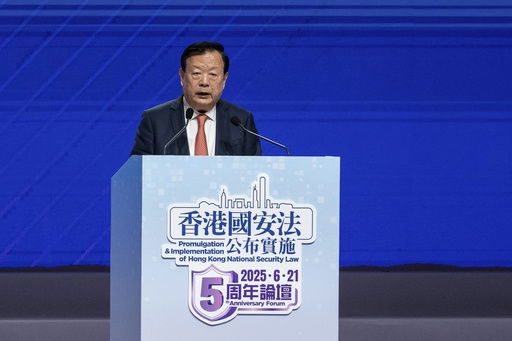Beijing official overseeing Hong Kong warns of persisting national security threats

By KANIS LEUNG
Associated Press
HONG KONG (AP) — A top Beijing official overseeing Hong Kong affairs on Saturday warned of persisting threats in the city as a China-imposed national security law approaches its fifth anniversary, while seeking to allay concerns about the law’s impact on the financial hub’s openness.
Speaking at a forum about the law, attended also by the city leader John Lee and other officials, Xia Baolong, the director of China’s Hong Kong and Macao Work Office, said various forms of soft resistance continue to emerge in new forms and external forces have never ceased their intervention in Hong Kong.
“Hong Kong has transformed from chaos to order. But just as a tree desires stillness, the wind continues to blow,” Xia said.
The Beijing and Hong Kong governments deemed the law necessary to maintain the city’s stability following anti-government protests in 2019. Under the law, many leading pro-democracy activists, including Jimmy Lai, founder of the now-defunct Apple Daily newspaper, were prosecuted. Dozens of civil society groups disbanded.
This month, authorities have stepped up their crackdown, including charging young activist Joshua Wong, who was already sentenced last year over a subversion case, under the law for the second time and targeting a mobile game app. Last week, China’s national security authorities in Hong Kong and the city’s police launched their first publicly known joint operation, raiding the homes of six people on suspicion of colluding with foreign forces to endanger national security.
Critics say the political changes indicate that the Western-style civil liberties Beijing promised to keep intact when the former British colony returned to Chinese rule in 1997 are shrinking.
But Xia said the law only targeted an extremely small number of people who severely endanger national security. He also sought to allay concerns about Hong Kong’s openness and international position.
He insisted that normal international exchanges do not violate Hong Kong’s national security law but rather are protected by it.



